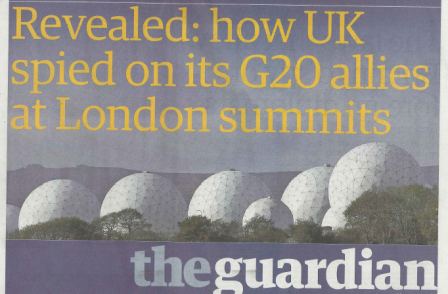
Britain’s spy services will lose contact with "some very dangerous individuals and groups" as a result of the Guardian’s Edward Snowden leaks, a Government minister has warned.
Security Minister James Brokenshire was addressing a debate on the Guardian’s impact on national security in Westminster Hall yesterday afternoon.
Brokenshire warned the information held on files leaked by Snowden present a “grave risk” to operators working for Britain’s security services.
He told MPs: "Once an adversary knows if and how they (the security services) can read their communications, they will change their behaviour.
"When it was revealed that the US could read Osama bin Laden's communications in the late 1990s, we didn't hear from him again until 2001.
"I cannot go into more detail about the damage done and the future damage, but we do expect to lose coverage of some very dangerous individuals and groups. The threat remains very real and only through the tireless efforts of the police and the intelligence services do we keep those who wish to do us harm at bay.
"If we are to do this, if we are to protect the British public, then we need to be a step ahead of the terrorists and the criminals. Secret intelligence gives us that edge."
The debate was called by Conservative MP Julian Smith who had earlier wrote to Metropolitan Commissioner Sir Brendan Hogan-Howe to investigate the newspaper.
Here's what it looks like when authoritarian functionaries try to convert journalism into criminality https://t.co/3FGvuoLHXK
— Glenn Greenwald (@ggreenwald) October 22, 2013
Smith told the debate: "The Guardian focused on sending abroad revelations not about the American NSA, or whistleblowing, they chose to distribute information about our own intelligence agents and GCHQ … to communicate, not just publish, any identifying information about GCHQ personnel is a terrorist offence.
"This is not press freedom – this is the Guardian's devastating impact on national security. The Guardian wrote its initial stories with no consultation with Government. The Guardian trafficked files on GCHQ around the world.
"And the Guardian has dragged its feet as this Government, police and intelligence services seek to limit the damage."
Smith was accused of launching “McCarthyite scaremongering” by Labour MP Paul Flynn who said it “disgraces Parliament”.
A spokesperson for the Guardian defended the paper's coverage: "Unfortunately, Julian Smith's speech propagated a series of myths about the Guardian's reporting of the Snowden documents. When responsible journalists working on the same story share documents they are engaged in journalism, not terrorism.
"Senior politicians and Government officials in the UK and internationally over 30 of the world's leading newspaper editors, and an overwhelming majority of the public, have all said that the Guardian's reporting on this story is important for democracy.
"They all agree, as does Mr Smith, that surveillance of citizens by intelligence agencies is a legitimate subject for debate. But there would be no public debate had there been no disclosure."
Meanwhile, Smith earlier accused the Director of Public Prosecutions Kier Starmer of "jeopardising" ongoing criminal investigations by giving an interview to the Guardian.
He has written to the Attorney General Dominic Grieve expressing his "shock and alarm" over Starmer's decision to talk to the paper.
“I understand that the Guardian is at least a witness if not a protagonist in a current criminal investigation.
“This intervention by the DPP risks jeopardising the ongoing Metropolitan Police criminal investigation and is a major breach of basic sub-judice principles.
“I want to put on the record my deep regret that the DPP made these comments and made them in a newspaper that I understand is currently a subject to legal proceedings.”
Email pged@pressgazette.co.uk to point out mistakes, provide story tips or send in a letter for publication on our "Letters Page" blog
